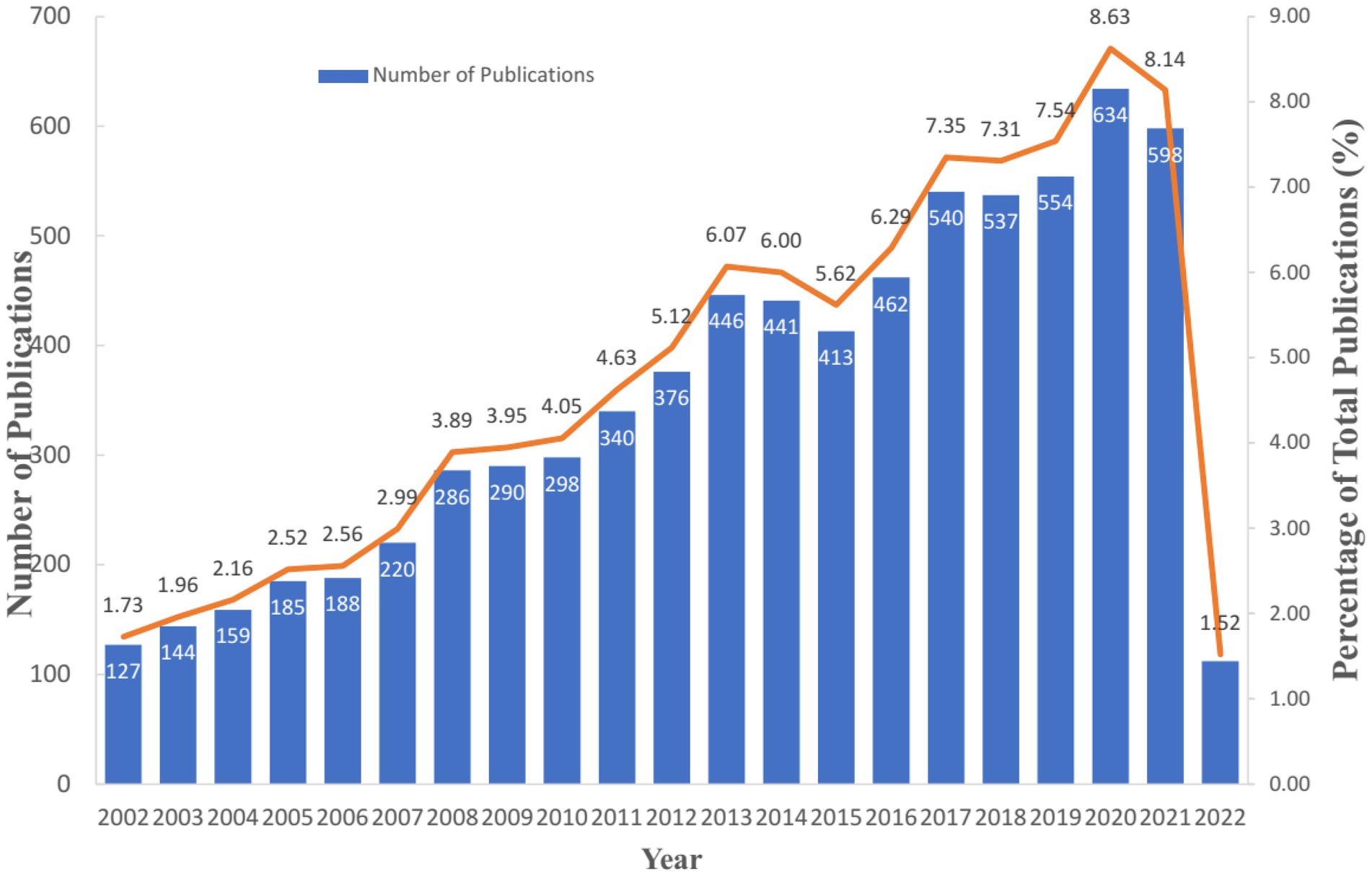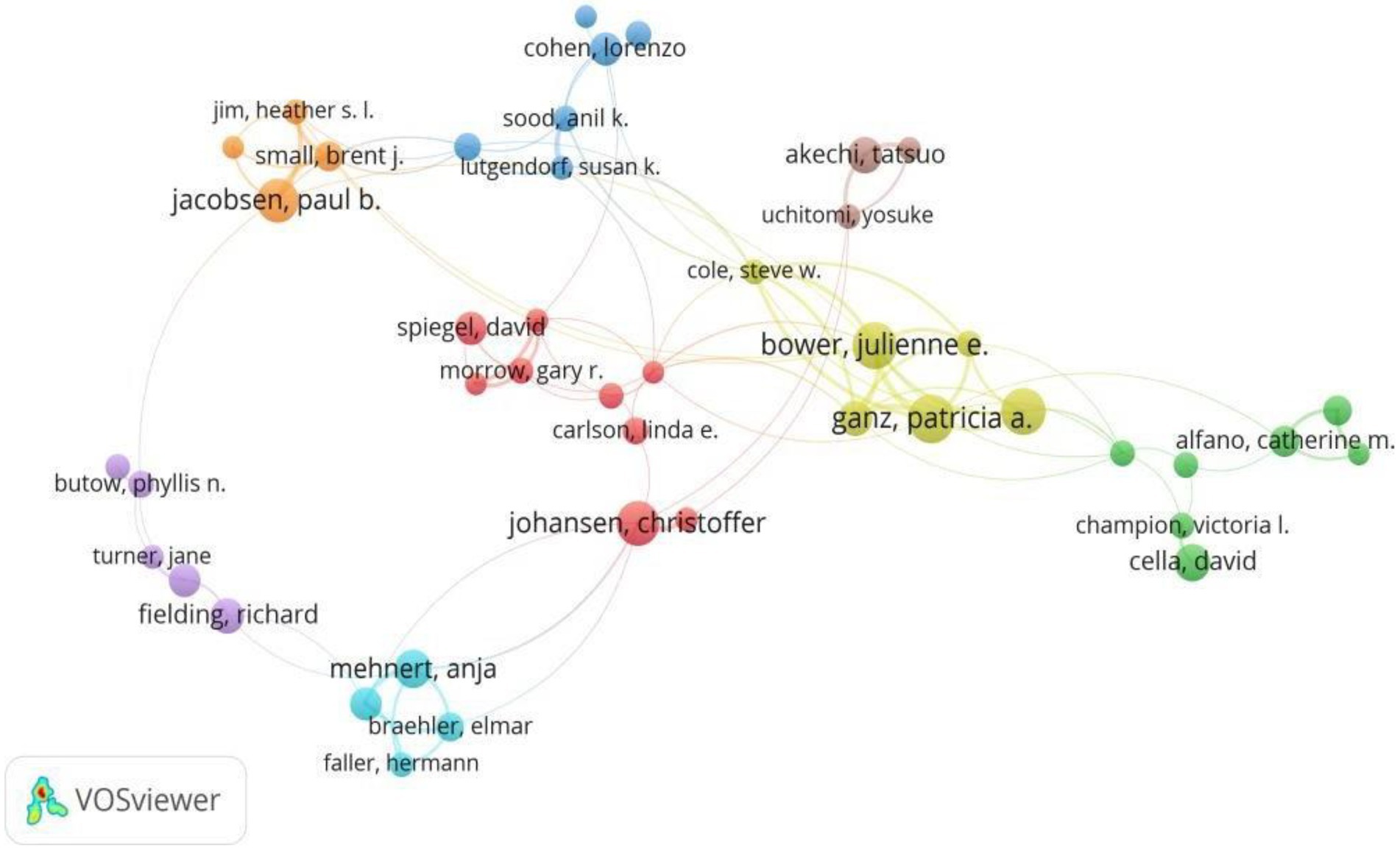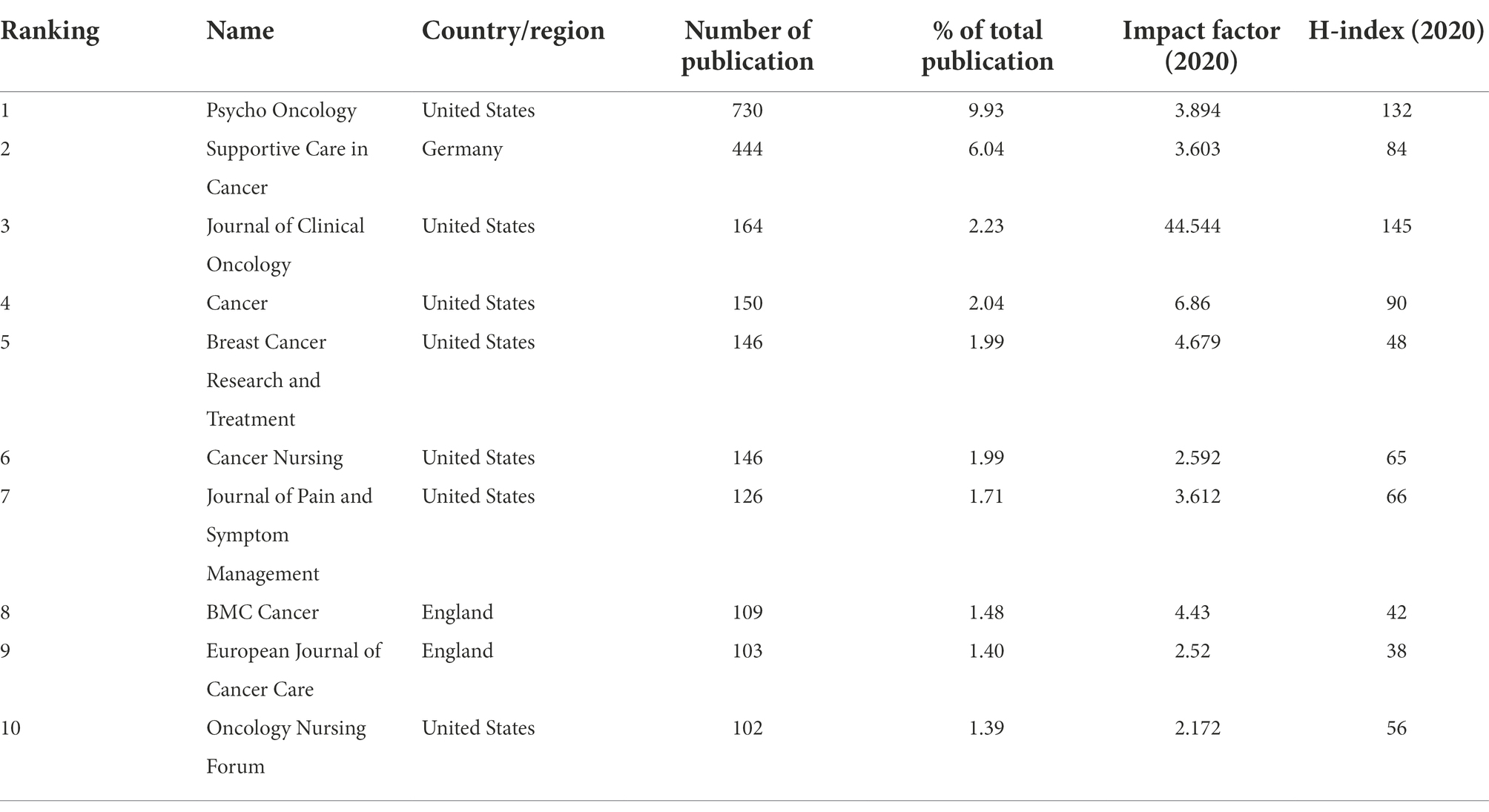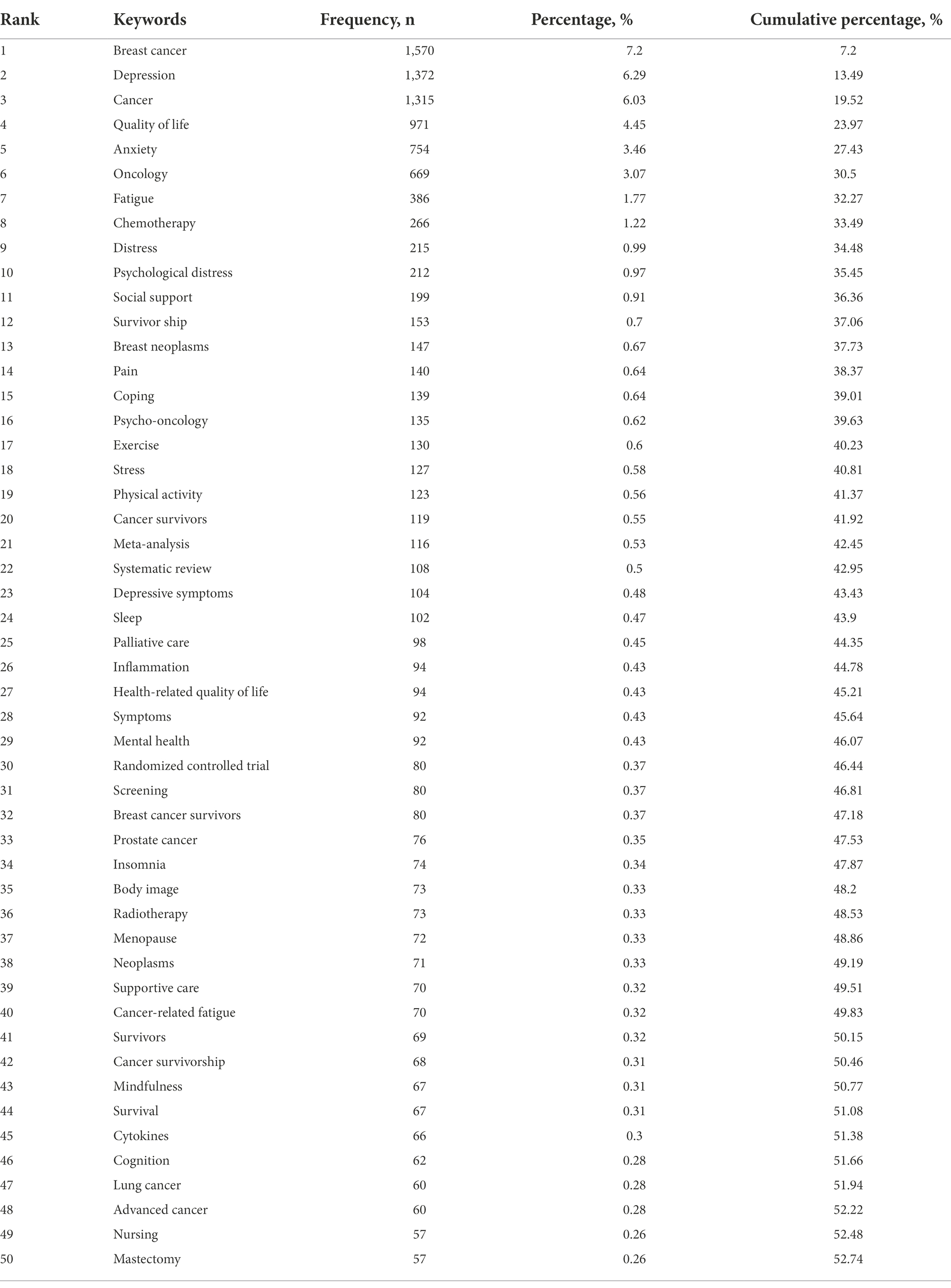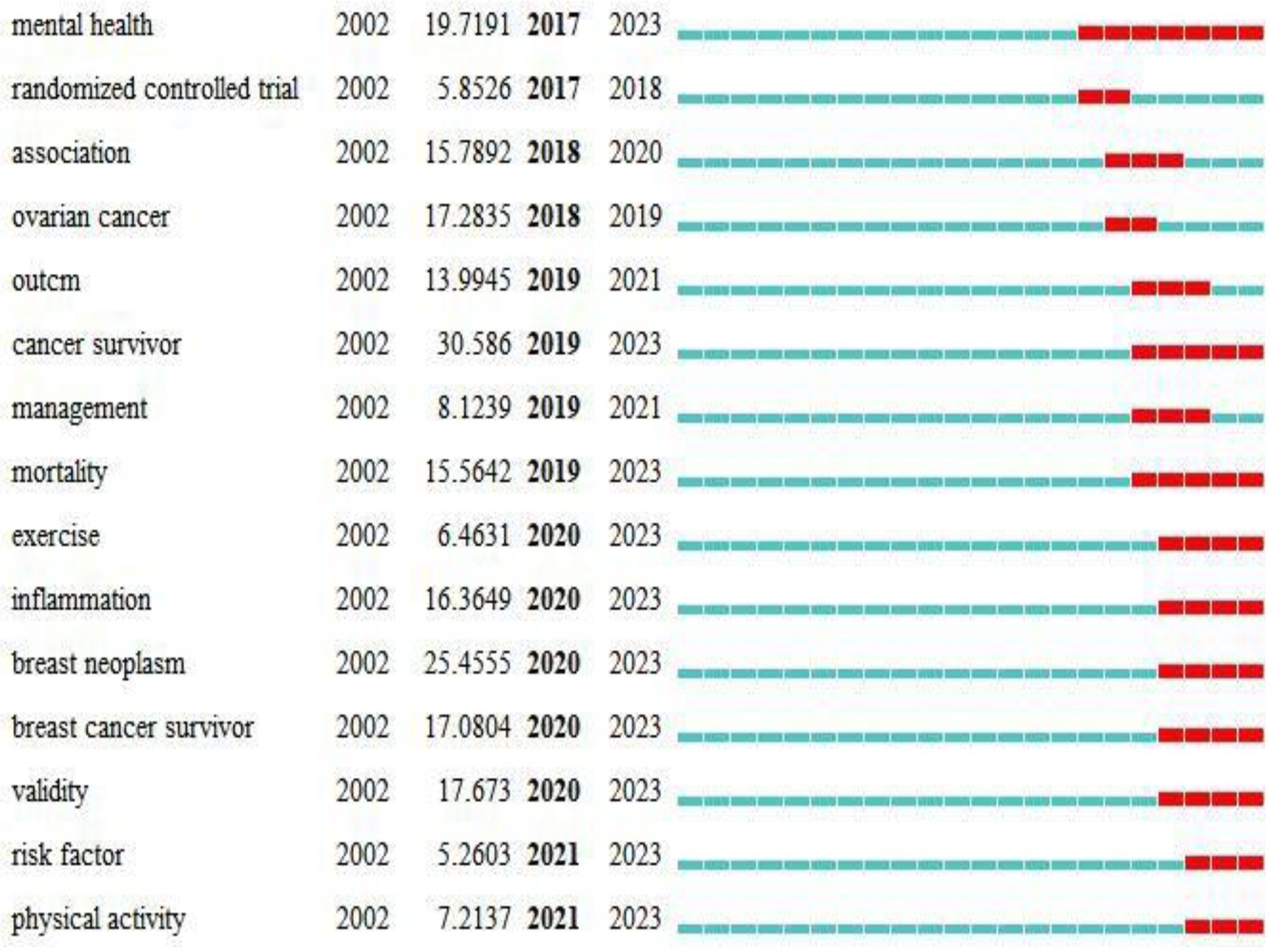- Department of Hepatobiliary Surgery, Affiliated Hospital of Guizhou Medical University, Guiyang, China
Background: Depression is common psychiatric morbidity in breast cancer survivors, seriously affecting patients’ quality of life and mental health. A growing body of research has investigated depression in breast cancer. However, no visual bibliometric analysis was conducted in this field. This study aimed to visualize the literature to identify hotspots and frontiers in research on breast cancer and depression.
Methods: The publications related to depression in breast cancer were retrieved in the Web of Science Core Collection between 1 January 2002 and 17 March 2022. VOSviewer was used to identify co-occurrences and collaborations among countries, institutions, and keywords. CiteSpace was used to detect keyword bursts.
Results: A total of 7,350 articles and reviews related to depression in breast cancer were identified. From 2002 to 2022, the United States and the People’s Republic of China were the most productive countries in this field. The University of California, Los Angeles, and the University of Toronto were the most productive institutions in this field. The Journal of Psycho-oncology, followed by Supportive Care in Cancer and the Journal of Clinical Oncology, had the most publications on depression in breast cancer. Of the top 10 journals, seven were from the United States, two were from England, and one was from Germany. Five research hotspots of depression in breast cancer were identified by co-word analysis. Research on post-traumatic growth, spiritual interventions, cognitive-behavioral therapy, physical activity, and symptom cluster management of depression in breast cancer was relatively mature in the core hotspots. Burst detection of keywords on depression in breast cancer showed the latest hotspots, such as mental health, cancer survivor mortality, and activity.
Conclusion: The research on depression in breast cancer is growing. Attention should be paid to the latest hotspots, such as mental health, cancer survivor, mortality, exercise, and physical activity.
Introduction
Breast cancer is the most prevalent malignant tumor in women, and its incidence is increasing yearly. Cancer statistics from the American Cancer Society (ACS) have shown that breast cancer is the most common cancer in women and the second leading cause of death, with increasing incidences yearly (Casadonte et al., 2021). According to recent data from the International Agency for Research on Cancer (IARC), the World Health Organization Agency for Cancer, there were approximately 2.26 million new female breast cancer cases worldwide in 2020, accounting for a quarter of all new cancer cases among women (Ferlay et al., 2021). Depression is a mental disorder that affects mental well-being, occupational performance, and quality of life, leading to physical symptoms. Depression is prevalent in 32.2% of all countries (Kulczyński et al., 2019). Of all malignant tumor sufferers, patients with breast cancer have the most severe psychological problems, with 40% of patients experiencing mental health problems (Oo et al., 2021). Surgery is an intense stressor for breast cancer patients and may destroy female secondary sexual characteristics. Therefore, the psychological stress of breast cancer patients during the perioperative period is particularly prominent, manifested as increased heart rate, elevated blood pressure, nervousness, anxiety, fear, sleep disturbance, etc. It can result in decreased immunity and affect the operation and postoperative rehabilitation. Radiotherapy and fatigue bring an excessive economic burden to the psychological burden. Lack of understanding from society and family, discrimination, and patients’ psychological endurance all contribute to depressive symptoms in patients.
Bibliometric analysis is an emerging tool for quickly exploring the status and trends of a subject or domain via statistical methods and visualization. This approach identifies relevant nodes and extracts useful information from large volumes of information (Jiang et al., 2018; Wang et al., 2021). Bibliometric software has been used in the scientometric analysis. CiteSpace and VOSviewer are the most popular tools for visualizing and analyzing scientific literature trends and patterns in bibliometric analysis (Wang and Lu, 2020; Xie et al., 2020).
So far, few bibliometric studies have been conducted on the global development of depression in breast cancer. To better understand the global trends and hot topics of depression in breast cancer, we conducted a bibliometric analysis of global publications related to depression in breast cancer between 2002 and 2022 based on VOSviewer.
Materials and methods
Data source
The data of this study were extracted from the Web of Science Core Collection on 17 March 2022, using the following retrieval strategy: “Breast Neoplasm*” OR “Breast Tumor*” OR “Breast Cancer” OR “Mammary Cancer*” OR “Malignant Neoplasm of Breast” OR “Human Mammary Neoplasm*” OR “Malignant Tumor of Breast” OR “Breast Malignant Tumor*” OR “Human Mammary Carcinoma*” OR “Breast Carcinoma*” (Topic) and Depress* (Topic), with the timespan from 2002 to 2022. Only articles and reviews were included. The language was limited to English. Two researchers independently retrieved and screened the publications. Any disagreement was resolved through discussion.
Data extraction
The following results of the literature were evaluated and recorded: (1) publication year, (2) journal title, (3) total citation count, (4) authorship, (5) WoS category, and (6) manuscript type. These manuscripts’ full records and cited references were imported into VOSviewer (CWTS, Leiden University, Leiden, Netherlands) for bibliometric analysis.
VOSviewer (Leiden University, Leiden, Netherlands) is a free visualized software for creating accessible maps using bibliographic data. VOS stands for “Visualization Of Similarities.” CiteSpace, designed by Professor Chaomei Chen, is a freely available Java application that can visualize and analyze scientific literature trends and patterns. This study used CiteSpace V and VOSviewer 1.6.8 to identify top journals, institutions, countries, co-occurrence of keywords, co-cited articles, and trends.
Results
Analysis of annual publications
From 2002 to 2022, 7,350 articles and reviews about depression in breast cancer were published in the Web of Science database (Figure 1). In the first 10 years, the topic of depression in breast cancer showed steady growth, accounting for 36.66% of the total publications. In the last 10 years, the number of papers on depression in breast cancer grew rapidly. As of 17 March 2022, 112 articles about depression caused by advanced breast cancer have been published, which are expected to overgrow throughout 2022. This indicates that depression in advanced breast cancer is gaining increasing attention.
Distribution characteristics of author
A total of 32,630 authors with 7,350 publications were involved in this field. The top 10 productive authors and co-cited authors are listed in Table 1. Miaskowski from the University of California in the United States was the most prolific author (69 publications), followed by Paul Steven (49 publications) and M Ganz Particia (43 publications). The authors’ co-cited network was generated as shown in Figure 2. Zigmond As was the most frequently co-cited author (1,445 citations), followed by Bower Julienne (1,380 citations) and Ganz Particia (990 citations).
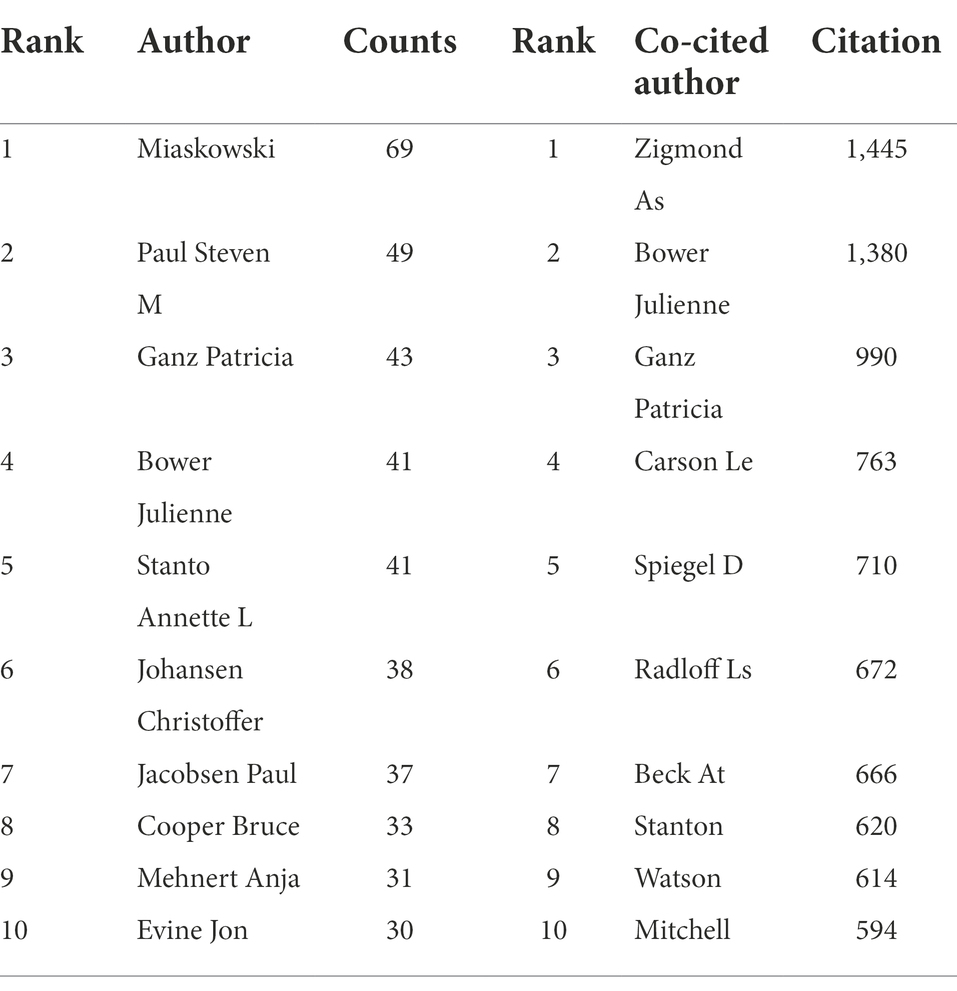
Table 1. Top 10 productive authors and co-cited authors in the field of depression in breast cancer.
Analysis of countries/regions and institutions
Sixty-four countries/regions have been involved in the studies of depression in breast cancer since 2002. The top 10 countries published 6,195 articles over the last two decades (Table 2). The United States was the most productive country (2,632 publications) with the highest H-index (221), followed by China (644 publications) with an H-index of 75, and England (479 publications) with an H-index of 126. As shown in Figure 3, the intensive clusters between China and the United States in the collaborative network indicated close cooperation between the two countries. The University of California made the most outstanding contributions to this field (169 publications), followed by the University of Toronto (144 publications), University of California (143 publications), and Memorial Sloan Kettering Cancer Center (135 publications).
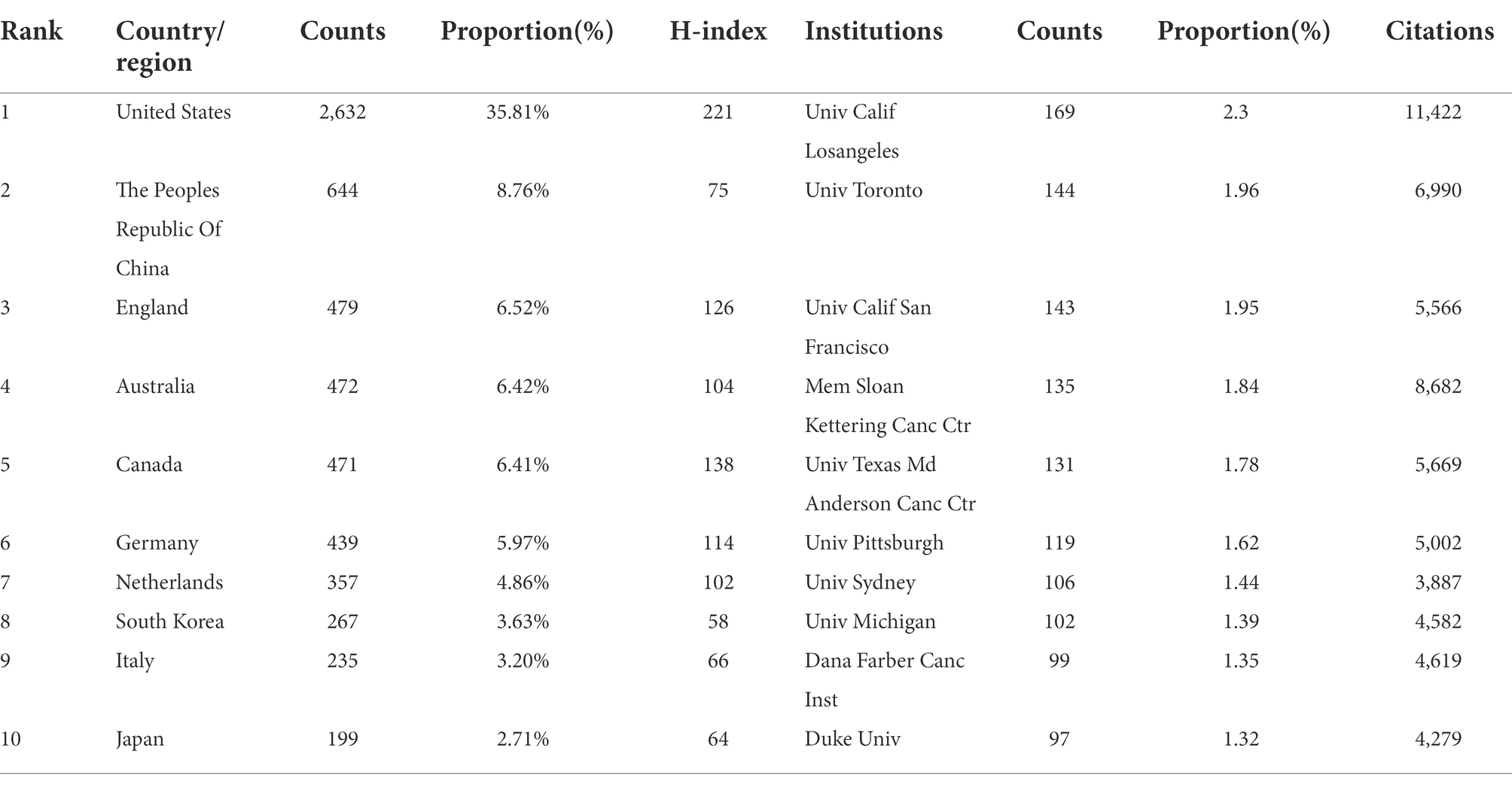
Table 2. The main countries, regions, and institutions contributing to publications on depression in breast cancer.
Analysis of journals
The top 10 productive journals with over 2,000 publications are listed in Table 3. The Journal of Psycho-Oncology ranked first with 730 publications (9.93%), followed by Supportive Care in Cancer (444, 6.04%) and Journal of Clinical Oncology (164, 2.23%). Of the top 10 journals, seven were from the US, two from England, and one from Germany. The Journal of Clinical Oncology had the highest impact factor (44.544), followed by Cancer (6.86).
Co-occurrence analysis and clustering analysis of keywords
Keywords indicate research hotspots, core content, and developing trends In a field. The Top five most frequent keywords were breast cancer (1,570), depression (1,372), cancer (1,315), quality of life (971), and anxiety (754; Table 4). As shown in the network map (Figure 4A), the keywords can be divided into five clusters: supportive care and post-traumatic growth (in red) mindfulness and psychotherapy (in green) cognitive-behavioral therapy and cognitive impairment (in blue) physical activity and physical function (in yellow) symptom cluster and symptom distress (in purple). The development of keywords over time was explored within the depression in breast cancer (Figure 4B). The keywords in purple appeared earlier while the keywords in yellow appeared later.
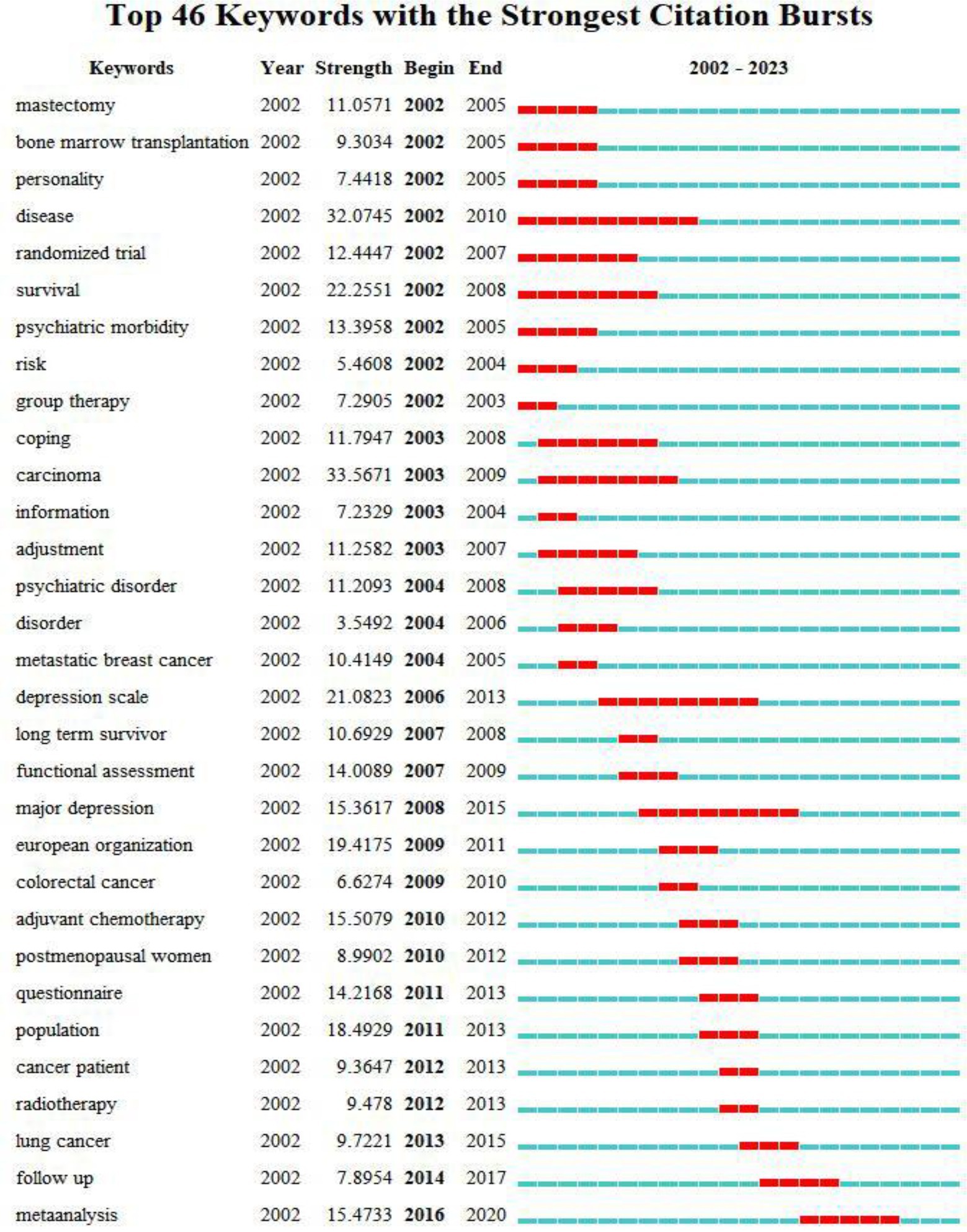
Figure 4. Keywords co-occurrence analysis of global research about depression in breast cancer. (A) Network visualization of the keywords; (B) Keywords co-occurrence overlay mapping from 2002 to 2022.
Burst of keywords
The burst of keywords reflects the sudden increase in keywords during a specific period, displays the time distribution and dynamic evolution of keywords, and accurately reveals the trends of research hotspots (Palesh et al., 2010; Qiu et al., 2013). The keywords with the strongest citation bursts were detected in the 7,350 publications using CiteSpace (Figure 5). The research frontiers included mental health (19.72), cancer survivor (30.59), mortality (15.56), exercise (6.46), and physical activity (7.21).
Discussion
Post-traumatic growth
The Chinese Psychosocial Oncology Therapy Guidelines for Cancer Patients, issued by the Chinese Psychosocial Oncology Society (CPOS) in 2016, pointed out that anxiety and depression are the major psychological problems in breast cancer patients, which may occur during the diagnosis, treatment, and rehabilitation periods. Anxiety and depression can affect the physical and mental development of cancer patients. Post-traumatic growth (PTG), positive psychological changes after encountering traumatic events, has become an important indicator to measure the psychological recovery of cancer patients. Anxiety and depression were proven to affect the PTG of breast cancer patients (Shi et al., 2021). Therefore, psychological interventions should be taken to reduce anxiety and depression, improve resilience, and promote PTG in breast cancer patients (Li et al., 2020). Studies suggested that the nurse-led supportive intervention relieved anxiety and depression, promoted post-traumatic growth, and facilitated recovery in breast cancer survivors (Xie et al., 2020; Wang et al., 2022).
Psychological interventions
A series of mindfulness-based therapies have been gradually developed, such as mindfulness-based cognitive therapy (MBCT), acceptance and commitment therapy (ACT), and mindfulness-based stress reduction (MBSR). These therapies include mindful eating, body scan, mindful breathing, mindful meditation, and 3-min breathing space. Mindfulness-based stress reduction therapy is currently the most widely used psychological intervention in breast cancer worldwide. Breast cancer diagnosis and treatment may drastically affect the quality of life and cause depression and anxiety. Mindfulness-based interventions can effectively relieve stress, improve mental states including anxiety and depression, and improve the quality of life in breast cancer patients (Kenne Sarenmalm et al., 2017; Priya and Kalra, 2018). Jing et al. (2021) reported that mindfulness-based intervention improved overall outcomes among Chinese breast cancer patients. Recent research showed that a mindfulness-based stress reduction approach, group counseling, and survivorship education could reduce depressive symptoms in young breast cancer survivors (Mirmahmoodi et al., 2020; Bower et al., 2021; Printz, 2021). Mindfulness has also benefited survivors by eliminating cancer-related pain and cognitive impairment (Smith et al., 2021; Duval et al., 2022). It was proven that implementing the multi-modal mindfulness-based intervention, including integrative dietary, physical activity, and mindfulness, enhanced breast cancer survivors’ quality of life and healthy lifestyle (Ruiz-Vozmediano et al., 2020; Wang et al., 2022). In the future, mindfulness can be added to clinical health education for patients with breast cancer to promote their overall quality of life.
Cognitive-behavioral therapy
Mastectomy can worsen body image and impact sexual performance among breast cancer patients. Therefore, their psychological problems are common, including increased heart rate, elevated blood pressure, tension, anxiety, fear, sleep disturbance, etc. These psychological problems can reduce patients’ immunity and affect surgery and postoperative rehabilitation. Computerized cognitive-behavioral therapy (CCBT) is an interactive computer interface with clear operation steps, web pages, comics, animations, videos, sounds, and other highly structured media interactions to modify how the patient thinks, believes, or behaves. The CCBT is designed to change the unhealthy cognitive structure and eliminate unhealthy emotions and behaviors. Studies confirmed that computerized cognitive-behavioral therapy could improve anxiety, depression, and sleep quality in preoperative breast cancer patients (Gorman et al., 2021).
Physical activity
Physical activity benefits breast cancer patients during treatment and survivorship. Evidence suggests that regular physical activity after breast cancer diagnosis reduces early all-cause mortality, breast cancer mortality, and cancer recurrence. In addition, regular moderate-to-vigorous physical activity can reduce cancer-related fatigue and depression and improve physical function during adjuvant treatment. One study showed that a 10-week physical exercise intervention significantly improved psychosocial well-being (Mehnert et al., 2011). Furthermore, postoperative standardized and effective functional exercise can reduce the occurrence of postoperative edema. Despite substantial evidence supporting physical activity’s benefits during cancer survivorship, most breast cancer patients do not adhere to the national exercise guidelines. Women with depressive symptoms feel exercise is challenging, but these self-perceptions do not reflect their physical condition. After breast cancer surgery, depression screening tools can be used to identify individuals with decreased physical activity during survivorship and to determine when to intervene.
Symptom cluster management
Breast cancer surgery and chemoradiation therapy can cause complications such as fatigue, pain, sleep disturbance, anxiety, and depression. Fatigue and pain are closely related, and pain can cause sleep disorders. Furthermore, sleep disorders are the main predisposing factors for anxiety, depression, and fatigue. These symptoms are interrelated, resulting in a synergistic effect of the symptom clusters, exacerbating the difficulty of patients’ recovery. Clinical studies have shown that rehabilitation exercises combined with acupoint massage can stimulate neuron regeneration and neurotrophic factor secretion, increase muscle strength and activity, improve various accompanying symptoms and improve quality of life. However, acupoint massage requires manual operation, making it difficult for patients to implement. On the other hand, there are significant individual differences in empirical treatment programs, and the long-term effects are challenging to evaluate and verify. The AR somatosensory acupoint massage is more effective in improving patients’ symptoms. Gradually increasing intervention time can further improve patients’ learning experience, encouraging them to actively complete training tasks and significantly improve their compliance with self-rehabilitation. Breast cancer patients receiving aromatase inhibitor therapy suffer various symptoms, which are affected by many factors such as anxiety, depression, educational level, and history of chemotherapy. Medical staff should pay attention to the patient’s psychological state, educational level, and history of chemotherapy during treatment and make decisions accordingly. Scientific, targeted, and individualized intervention programs should be developed to improve the patient’s symptoms.
Strengths and limitations
According to our knowledge, this study is the first bibliometric analysis of depression in breast cancer. It can provide a historical perspective for future research and highlight research areas requiring further investigation. In addition, before the literature retrieval, we read many high-level papers and extracted search terms related to depression in breast cancer. After integration, we formulated the search strategy for this study. Therefore, the search strategy is complete and scientific. Meanwhile, this study has some shortcomings. The WOS database, which owns standardized and comprehensive records for bibliometric analysis, is considered the most reliable data source. Therefore, we only searched this. Some studies outside this database may have been overlooked. In addition, this study has many authors, some of whom may have changed names or researched from multiple institutions. Although we have carefully checked the process, some mistakes are inevitable.
Data availability statement
The original contributions presented in the study are included in the article/supplementary material, further inquiries can be directed to the corresponding author.
Author contributions
LC wrote the manuscript. TR designed and guided the research. YT analyzed the data. HL prepared the figures and tables. All authors contributed to the article and approved the submitted version.
Funding
This study was funded by the Guizhou Provincial Health and Health Commission (Gzwkj2022-244), the Nursing Hospital Fund Project of Affiliated Hospital of Guizhou Medical University (Project No. GYHLB202203), and the Nursing Hospital Fund Project of Affiliated Hospital of Guizhou Medical University (Grant No. GYHLB202222).
Conflict of interest
The authors declare that the research was conducted in the absence of any commercial or financial relationships that could be construed as a potential conflict of interest.
Publisher’s note
All claims expressed in this article are solely those of the authors and do not necessarily represent those of their affiliated organizations, or those of the publisher, the editors and the reviewers. Any product that may be evaluated in this article, or claim that may be made by its manufacturer, is not guaranteed or endorsed by the publisher.
References
Bower, J. E., Partridge, A. H., Wolff, A. C., Thorner, E. D., Irwin, M. R., Joffe, H., et al. (2021). Targeting depressive symptoms in younger breast cancer survivors: the pathways to wellness randomized controlled trial of mindfulness meditation and survivorship education. J. Clin. Oncol. 39, 3473–3484. doi: 10.1200/jco.21.00279
Casadonte, R., Kriegsmann, M., Kriegsmann, K., Hauk, I., Meliß, R. R., Müller, C. S. L., et al. (2021). Imaging mass spectrometry-based proteomic analysis to differentiate melanocytic nevi and malignant melanoma. Cancers 13, 1–14. doi: 10.3390/cancers13133197
Duval, A., Davis, C. G., Khoo, E. L., Romanow, H., Shergill, Y., Rice, D., et al. (2022). Mindfulness-based stress reduction and cognitive function among breast cancer survivors: a randomized controlled trial. Cancer 128, 2520–2528. doi: 10.1002/cncr.34209
Ferlay, J., Colombet, M., Soerjomataram, I., Parkin, D. M., Piñeros, M., Znaor, A., et al. (2021). Cancer statistics for the year 2020: an overview. Int. J. Cancer 149, 778–789. doi: 10.1002/ijc.33588
Gorman, J. R., Drizin, J. H., Al-Ghadban, F. A., and Rendle, K. A. (2021). Adaptation and feasibility of a multimodal mindfulness-based intervention to promote sexual health in cancer survivorship. Transl. Behav. Med. 11, 1885–1895. doi: 10.1093/tbm/ibab083
Jiang, M., Qi, Y., Liu, H., and Chen, Y. (2018). The role of nanomaterials and nanotechnologies in wastewater treatment: a bibliometric analysis. Nanoscale Res. Lett. 13:233. doi: 10.1186/s11671-018-2649-4
Jing, S., Zhang, A., Chen, Y., Shen, C., Currin-McCulloch, J., and Zhu, C. (2021). Mindfulness-based interventions for breast cancer patients in China across outcome domains: a systematic review and meta-analysis of the Chinese literature. Support. Care Cancer 29, 5611–5621. doi: 10.1007/s00520-021-06166-0
Kenne Sarenmalm, E., Mårtensson, L. B., Andersson, B. A., Karlsson, P., and Bergh, I. (2017). Mindfulness and its efficacy for psychological and biological responses in women with breast cancer. Cancer Med. 6, 1108–1122. doi: 10.1002/cam4.1052
Kulczyński, B., Sidor, A., and Gramza-Michałowska, A. (2019). Characteristics of selected Antioxidative and bioactive compounds in meat and animal origin products. Antioxidants 8:335. doi: 10.3390/antiox8090335
Li, L., Hou, Y., Li, L., Hou, Y., Kang, F., and Wei, X. (2020). The mediating and moderating roles of resilience in the relationship between anxiety, depression, and post-traumatic growth among breast cancer patients based on structural equation modeling: an observational study. Medicine 99:e23273. doi: 10.1097/md.0000000000023273
Mehnert, A., Veers, S., Howaldt, D., Braumann, K. M., Koch, U., and Schulz, K. H. (2011). Effects of a physical exercise rehabilitation group program on anxiety, depression, body image, and health-related quality of life among breast cancer patients. Onkologie 34, 248–253. doi: 10.1159/000327813
Mirmahmoodi, M., Mangalian, P., Ahmadi, A., and Dehghan, M. (2020). The effect of mindfulness-based stress reduction group counseling on psychological and inflammatory responses of the women with breast cancer. Integr. Cancer Ther. 19:1534735420946819. doi: 10.1177/1534735420946819
Oo, K. K., Kamolhan, T., Soni, A., Thongchot, S., Mitrpant, C., Charoenrat, P., et al. (2021). Development of an engineered peptide antagonist against periostin to overcome doxorubicin resistance in breast cancer. BMC Cancer 21:65. doi: 10.1186/s12885-020-07761-w
Palesh, O. G., Roscoe, J. A., Mustian, K. M., Roth, T., Savard, J., Ancoli-Israel, S., et al. (2010). Prevalence, demographics, and psychological associations of sleep disruption in patients with cancer: University of Rochester Cancer Center-Community Clinical Oncology Program. J. Clin. Oncol. 28, 292–298. doi: 10.1200/jco.2009.22.5011
Printz, C. (2021). Mindfulness meditation helps younger breast cancer survivors. Cancer 127:2607. doi: 10.1002/cncr.33759
Priya, G., and Kalra, S. (2018). Mind-body interactions and mindfulness meditation in diabetes. Eur. Endocrinol. 14, 35–41. doi: 10.17925/ee.2018.14.1.35
Qiu, J., Chen, W., Gao, X., Xu, Y., Tong, H., Yang, M., et al. (2013). A randomized controlled trial of group cognitive behavioral therapy for Chinese breast cancer patients with major depression. J. Psychosom. Obstet. Gynaecol. 34, 60–67. doi: 10.3109/0167482x.2013.766791
Ruiz-Vozmediano, J., Löhnchen, S., Jurado, L., Recio, R., Rodríguez-Carrillo, A., López, M., et al. (2020). Influence of a multidisciplinary program of diet, exercise, and mindfulness on the quality of life of stage IIA-IIB breast cancer survivors. Integr. Cancer Ther. 19:1534735420924757. doi: 10.1177/1534735420924757
Shi, G., Shi, T., Liu, Y., and Cai, Y. (2021). Relationships between dyadic coping, intimate relationship and post-traumatic growth in patients with breast cancer: a cross-sectional study. J. Adv. Nurs. 77, 4733–4742. doi: 10.1111/jan.14946
Smith, A. M., Leeming, A., Fang, Z., Hatchard, T., Mioduszewski, O., Schneider, M. A., et al. (2021). Mindfulness-based stress reduction alters brain activity for breast cancer survivors with chronic neuropathic pain: preliminary evidence from resting-state fMRI. J. Cancer Surviv. 15, 518–525. doi: 10.1007/s11764-020-00945-0
Wang, L., Feng, W., Duan, J., and Liang, J. (2021). Pharmacovigilance Bibliometrics: visualizing thematic development in the category of pharmacology and pharmacy in web of science. Front. Pharmacol. 12:731757. doi: 10.3389/fphar.2021.731757
Wang, G., Li, Z., Luo, X., Wei, R., Liu, H., Yang, J., et al. (2022). Effects of nurse-led supportive-expressive group intervention for post-traumatic growth among breast cancer survivors: a randomized clinical trial. J. Nurs. Scholarsh. 54, 434–444. doi: 10.1111/jnu.12752
Wang, W., and Lu, C. (2020). Visualization analysis of big data research based on Citespace. Soft. Comput. 24, 8173–8186. doi: 10.1007/s00500-019-04384-7
Keywords: breast cancer, bibliometric analysis, co-citation analysis, research hotspots, depression
Citation: Chen L, Ren T, Tan Y and Li H (2022) Global trends of research on depression in breast cancer: A bibliometric study based on VOSviewer. Front. Psychol. 13:969679. doi: 10.3389/fpsyg.2022.969679
Edited by:
Raman Kumar, Guru Nanak Dev Engineering College, IndiaReviewed by:
Sukhpal Singh, Guru Nanak Dev Engineering College, IndiaGagandeep Kaur, Panjab University, India
Copyright © 2022 Chen, Ren, Tan and Li. This is an open-access article distributed under the terms of the Creative Commons Attribution License (CC BY). The use, distribution or reproduction in other forums is permitted, provided the original author(s) and the copyright owner(s) are credited and that the original publication in this journal is cited, in accordance with accepted academic practice. No use, distribution or reproduction is permitted which does not comply with these terms.
*Correspondence: Tingting Ren, ODUxNzMzNjExQHFxLmNvbQ==
 Ling Chen
Ling Chen Tingting Ren
Tingting Ren Yun Tan
Yun Tan